 Tìm kiếm
Tìm kiếm
Chương II Luật người cao tuổi năm 2009: Phụng dưỡng, chăm sóc người cao tuổi
| Số hiệu: | 39/2009/QH12 | Loại văn bản: | Luật |
| Nơi ban hành: | Quốc hội | Người ký: | Nguyễn Phú Trọng |
| Ngày ban hành: | 23/11/2009 | Ngày hiệu lực: | 01/07/2010 |
| Ngày công báo: | 25/03/2010 | Số công báo: | Từ số 131 đến số 132 |
| Lĩnh vực: | Văn hóa - Xã hội | Tình trạng: | Còn hiệu lực |
TÓM TẮT VĂN BẢN
Văn bản tiếng việt
Văn bản tiếng anh
1. Phụng dưỡng người cao tuổi là chăm sóc đời sống tinh thần, vật chất nhằm đáp ứng nhu cầu cơ bản về ăn, mặc, ở, đi lại, chăm sóc sức khoẻ và các nhu cầu về vui chơi, giải trí, thông tin, giao tiếp, học tập của người cao tuổi.
2. Người có nghĩa vụ và quyền phụng dưỡng người cao tuổi là con, cháu của người cao tuổi và những người khác có nghĩa vụ nuôi dưỡng, cấp dưỡng theo quy định của pháp luật về hôn nhân và gia đình.
3. Người có nghĩa vụ và quyền phụng dưỡng người cao tuổi tùy theo hoàn cảnh cụ thể phải sắp xếp nơi ở phù hợp với điều kiện sức khoẻ, tâm lý của người cao tuổi; chu cấp về kinh tế; thanh toán chi phí điều trị và chăm sóc y tế động viên khi người cao tuổi ốm đau; mai táng khi người cao tuổi chết.
4. Người có nghĩa vụ và quyền phụng dưỡng người cao tuổi phải cùng nhau hợp tác trong việc phụng dưỡng người cao tuổi.
5. Khuyến khích tổ chức, cá nhân không thuộc đối tượng quy định tại khoản 2 Điều này tham gia phụng dưỡng người cao tuổi.
1. Người có nghĩa vụ và quyền phụng dưỡng không có điều kiện trực tiếp chăm sóc người cao tuổi thì uỷ nhiệm cho cá nhân hoặc tổ chức cung ứng dịch vụ chăm sóc người cao tuổi, nhưng phải được người cao tuổi đồng ý.
Việc uỷ nhiệm chăm sóc người cao tuổi được thực hiện dưới hình thức hợp đồng dịch vụ giữa người có nghĩa vụ và quyền phụng dưỡng với cá nhân hoặc tổ chức cung ứng dịch vụ.
2. Cá nhân hoặc tổ chức cung ứng dịch vụ được uỷ nhiệm chăm sóc người cao tuổi có trách nhiệm thực hiện đầy đủ cam kết theo hợp đồng dịch vụ với người uỷ nhiệm.
3. Người cao tuổi có quyền yêu cầu người có nghĩa vụ và quyền phụng dưỡng thay đổi cá nhân hoặc tổ chức cung ứng dịch vụ được uỷ nhiệm chăm sóc mình.
4. Chính phủ quy định chi tiết Điều này.
1. Việc ưu tiên khám bệnh, chữa bệnh cho người cao tuổi được thực hiện như sau:
a) Người từ đủ 80 tuổi trở lên được ưu tiên khám trước người bệnh khác trừ bệnh nhân cấp cứu, trẻ em dưới 6 tuổi, người khuyết tật nặng;
b) Bố trí giường nằm phù hợp khi điều trị nội trú.
2. Các bệnh viện, trừ bệnh viện chuyên khoa nhi, có trách nhiệm sau đây:
a) Tổ chức khoa lão khoa hoặc dành một số giường để điều trị người bệnh là người cao tuổi;
b) Phục hồi sức khoẻ cho người bệnh là người cao tuổi sau các đợt điều trị cấp tính tại bệnh viện và hướng dẫn tiếp tục điều trị, chăm sóc tại gia đình;
c) Kết hợp các phương pháp điều trị y học cổ truyền với y học hiện đại, hướng dẫn các phương pháp chữa bệnh không dùng thuốc ở tuyến y tế cơ sở đối với người bệnh là người cao tuổi.
3. Nhà nước khuyến khích tổ chức, cá nhân khám bệnh, chữa bệnh miễn phí cho người cao tuổi.
1. Trạm y tế xã, phường, thị trấn có trách nhiệm sau đây:
a) Triển khai các hình thức tuyên truyền, phổ biến kiến thức phổ thông về chăm sóc sức khỏe; hướng dẫn người cao tuổi kỹ năng phòng bệnh, chữa bệnh và tự chăm sóc sức khoẻ;
b) Lập hồ sơ theo dõi, quản lý sức khoẻ người cao tuổi;
c) Khám bệnh, chữa bệnh phù hợp với chuyên môn cho người cao tuổi;
d) Phối hợp với cơ sở khám bệnh, chữa bệnh tuyến trên tổ chức kiểm tra sức khoẻ định kỳ cho người cao tuổi.
2. Trạm y tế xã, phường, thị trấn cử cán bộ y tế đến khám bệnh, chữa bệnh tại nơi cư trú đối với người cao tuổi cô đơn bị bệnh nặng không thể đến khám bệnh, chữa bệnh tại cơ sở khám bệnh, chữa bệnh. Uỷ ban nhân dân xã, phường, thị trấn có trách nhiệm hỗ trợ việc đưa người bệnh quy định tại khoản này tới cơ sở khám bệnh, chữa bệnh theo đề nghị của trạm y tế xã, phường, thị trấn.
3. Nhà nước khuyến khích tổ chức, cá nhân khám bệnh, chữa bệnh cho người cao tuổi tại nơi cư trú.
4. Kinh phí để thực hiện các quy định tại điểm a, b và d khoản 1 và khoản 2 Điều này do ngân sách nhà nước bảo đảm.
1. Nhà nước đầu tư và khuyến khích tổ chức, cá nhân đầu tư xây dựng cơ sở văn hóa, giáo dục, thể dục, thể thao, giải trí, du lịch nhằm đáp ứng nhu cầu tinh thần và rèn luyện sức khoẻ của người cao tuổi.
2. Nhà nước và xã hội tạo điều kiện thuận lợi để người cao tuổi được học tập, nghiên cứu và tham gia hoạt động văn hóa, thể dục, thể thao, giải trí, du lịch thông qua các biện pháp sau đây:
a) Cung cấp thông tin, tài liệu, người hướng dẫn để người cao tuổi tham gia học tập, nghiên cứu;
b) Hỗ trợ, hướng dẫn người cao tuổi tham gia hoạt động văn hóa, giải trí du lịch, luyện tập dưỡng sinh và các hoạt động thể dục, thể thao khác phù hợp với sức khỏe và tâm lý;
c) Hỗ trợ địa điểm, dụng cụ, phương tiện và cơ sở vật chất khác phù hợp với hoạt động của người cao tuổi;
d) Khuyến khích doanh nghiệp, cá nhân sản xuất, kinh doanh sản phẩm, hàng hoá phù hợp với nhu cầu của người cao tuổi.
3. Chính phủ quy định chi tiết Điều này.
1. Việc xây dựng mới hoặc cải tạo khu chung cư, công trình công cộng khác phải phù hợp với đặc điểm, nhu cầu sử dụng của người cao tuổi.
2. Khi tham gia giao thông công cộng, người cao tuổi được giúp đỡ, sắp xếp chỗ ngồi thuận tiện.
3. Chính phủ quy định chi tiết Điều này.
Người cao tuổi được giảm giá vé, giá dịch vụ khi sử dụng một số dịch vụ theo quy định của Chính phủ.
1. Người cao tuổi thuộc hộ gia đình nghèo không có người có nghĩa vụ và quyền phụng dưỡng hoặc có người có nghĩa vụ và quyền phụng dưỡng nhưng người này đang hưởng chế độ trợ cấp xã hội hằng tháng.
2. Người từ đủ 80 tuổi trở lên không thuộc trường hợp quy định tại khoản 1 Điều này mà không có lương hưu, trợ cấp bảo hiểm xã hội hằng tháng trợ cấp xã hội hằng tháng.
1. Người cao tuổi quy định tại Điều 17 của Luật này được hưởng bảo hiểm y tế, được hưởng trợ cấp xã hội hằng tháng và hỗ trợ chi phí mai táng khi chết, trừ trường hợp quy định tại khoản 2 Điều này.
2. Người cao tuổi thuộc hộ gia đình nghèo không có người có nghĩa vụ và quyền phụng dưỡng, không có điều kiện sống ở cộng đồng, có nguyện vọng và được tiếp nhận vào cơ sở bảo trợ xã hội thì được hưởng các chế độ sau đây:
a) Trợ cấp nuôi dưỡng hằng tháng;
b) Cấp tư trang, vật dụng phục vụ cho sinh hoạt thường ngày;
c) Được hưởng bảo hiểm y tế;
d) Cấp thuốc chữa bệnh thông thường;
đ) Cấp dụng cụ, phương tiện hỗ trợ phục hồi chức năng;
e) Mai táng khi chết.
3. Chính phủ quy định chi tiết Điều này.
Người cao tuổi thuộc diện quy định tại khoản 2 Điều 18 mà có người nhận chăm sóc tại cộng đồng thì được hưởng trợ cấp xã hội hằng tháng bằng mức nuôi dưỡng tại cơ sở bảo trợ xã hội, được hưởng bảo hiểm y tế và hỗ trợ chi phí mai táng khi chết.
1. Cơ sở chăm sóc người cao tuổi là nơi chăm sóc, nuôi dưỡng, tư vấn hoặc hỗ trợ những điều kiện cần thiết khác cho người cao tuổi.
2. Cơ sở chăm sóc người cao tuổi bao gồm:
a) Cơ sở bảo trợ xã hội;
b) Cơ sở tư vấn, dịch vụ chăm sóc người cao tuổi;
c) Cơ sở chăm sóc người cao tuổi khác.
Chính phủ quy định chi tiết việc thành lập và hoạt động của các cơ sở chăm sóc người cao tuổi quy định tại khoản này.
3. Nhà nước khuyến khích tổ chức, cá nhân đầu tư xây dựng cơ sở chăm sóc người cao tuổi; đầu tư cơ sở vật chất và hỗ trợ kinh phí hoạt động cho cơ sở chăm sóc người cao tuổi công lập; hỗ trợ kinh phí cho cơ sở chăm sóc người cao tuổi ngoài công lập nuôi dưỡng người cao tuổi quy định tại khoản 2 Điều 18 của Luật này.
4. Tổ chức, cá nhân đóng góp, đầu tư xây dựng cơ sở chăm sóc người cao tuổi bằng nguồn kinh phí của mình được hưởng các chính sách ưu đãi theo quy định của pháp luật về chính sách khuyến khích xã hội hóa đối với các hoạt động trong lĩnh vực giáo dục, dạy nghề, y tế, văn hóa, thể thao, môi trường.
1. Người thọ 100 tuổi được Chủ tịch nước Cộng hoà xã hội chủ nghĩa Việt Nam chúc thọ và tặng quà.
2. Người thọ 90 tuổi được Chủ tịch Uỷ ban nhân dân tỉnh, thành phố trực thuộc trung ương chúc thọ và tặng quà.
3. Uỷ ban nhân dân xã, phường, thị trấn phối hợp với Hội người cao tuổi tại địa phương, gia đình của người cao tuổi tổ chức mừng thọ người cao tuổi ở tuổi 70, 75, 80, 85, 90, 95 và 100 tuổi trở lên vào một trong các ngày sau đây:
a) Ngày người cao tuổi Việt Nam;
b) Ngày Quốc tế người cao tuổi;
c) Tết Nguyên đán;
d) Sinh nhật của người cao tuổi.
4. Kinh phí thực hiện quy định tại Điều này do ngân sách nhà nước bảo đảm và nguồn đóng góp của xã hội.
1. Khi người cao tuổi chết, người có nghĩa vụ và quyền phụng dưỡng người cao tuổi có trách nhiệm chính trong việc tổ chức tang lễ và mai táng cho người cao tuổi theo nghi thức trang trọng, tiết kiệm, bảo đảm nếp sống văn hoá, trừ trường hợp pháp luật có quy định khác; trường hợp người cao tuổi không có người có nghĩa vụ và quyền phụng dưỡng hoặc có người có nghĩa vụ và quyền phụng dưỡng nhưng người này không có điều kiện tổ chức tang lễ và mai táng thì Uỷ ban nhân dân xã, phường, thị trấn hoặc cơ sở bảo trợ xã hội nơi người cao tuổi cư trú chủ trì phối hợp với Hội người cao tuổi và các tổ chức đoàn thể tại địa phương tổ chức tang lễ và mai táng.
2. Khi người cao tuổi chết, cơ quan, tổ chức nơi người cao tuổi đang làm việc hoặc cơ quan, tổ chức nơi làm việc cuối cùng của người cao tuổi, Hội người cao tuổi, Uỷ ban nhân dân xã, phường, thị trấn và các tổ chức đoàn thể tại địa phương có trách nhiệm phối hợp với gia đình người cao tuổi tổ chức tang lễ và mai táng.
TAKING CARE OF AND LOOKING AFTER THE ELDERLY
SECTION I. TAKING CARE OF THE ELDERLY
Article 10. Obligations and rights to take care of the elderly
1. Taking care of the elderly means caring for their spiritual and material lives, aiming to satisfy their basic food, clothing, lodging, travel and healthcare needs as well as entertainment, recreation, information, communication and learning needs.
2. Persons having the obligations and rights to take care of the elderly are their children and grandchildren and other persons obliged to take care of or provide financial supports under the law on marriage and family.
3. Persons having the obligations and rights to take care of the elderly shall, depending on their specific circumstances, arrange the elderly's lodgings suitable to their health and psychological conditions; provide financial assistance; pay hospitalization and healthcare costs and encourage the elderly when they fall sick: organize funerals when they die.
4. Persons having the obligations and rights to take care of the elderly shall cooperate with one another in looking after them.
5. Organizations and individuals other than those defined in Clause 2 of this Article arc encouraged to participate in take caring of the elderly.
Article 11. Entrusted care for the elderly
1. Persons having the obligations and rights to take care of the elderly but having no conditions to directly look after the elderly may entrust individuals or organizations providing services of taking care of the elderly to look after the elderly, but with the elderly's consent.
Entrustment to look after the elderly shall be effected under service contracts between persons having the obligations and rights to take care of the elderly and service providers.
2. Service providers entrusted to look after the elderly shall fulfill their commitments under service contracts signed with entrusters.
3. The elderly may request persons with care-taking obligations and rights to replace service providers entrusted to take care of them.
4. The Government shall detail this Article.
SECTION 2. CARING FOR THE ELDERLY'S HEALTH
Article 12. Medical examination and treatment
1. Prioritized medical examination and treatment for the elderly shall be carried out as follows:
a/ Persons aged full 80 or older shall be given priority for medical examination before other persons, except emergency patients, under-6 children and heavily disabled people;
b/ Elderly inpatients are arranged proper hospital beds.
2. Hospitals, except pediatrics hospitals, have the following responsibilities:
a/ To organize gerontologic departments or set aside a number of beds for treatment of elderly patients:
b/ To rehabilitate elderly patients' health after pernicious disease treatments at hospital and guide their further treatment and care at home;
c/ To combine traditional medicine with modern medicine in treatment and guide methods of non-medicine treatment at grassroots health establishments for elderly patients:
d/ The Stale encourages organizations and individuals to give free-of- charge medical examination and treatment to the elderly.
Article 13. Primary healthcare at places of residence
1. Commune, ward, township health stations have the following responsibilities:
a/To carry out propaganda and dissemination in different forms of common healthcare knowledge; guide the elderly in skills of disease prevention and treatment and self-healthcare;
b/ To compile files for the elderly's health monitoring and management;
c/ To give medical examination and treatment suitable to their specialization to the elderly;
d/ To coordinate with higher-level medical establishments in organizing periodical health checkups for the elderly.
2. Commune, ward or township health stations shall send health workers to conduct medical examination and treatment at places of residence of lonely and seriously ill elderly persons who cannot go to medical establishments for examination and treatment. Commune, ward or township People's Committees shall support the transport of patients defined in this Clause to medical establishments at the proposal of commune, ward or township health stations.
3. The State encourages organizations and individuals to give medical examination and treatment to the elderly at their places of residence.
4. Funds for the implementation of tasks defined at Points a, b and d. Clauses 1 and 2 of this Article shall be provided by the state budget.
SECTION 3. CARE FOR THE ELDERLY IN CULTURAL, EDUCATIONAL, PHYSICAL TRAINING SPORTS, RECREATION AND TOURIST ACTIVITIES, IN THE USE OF PUBLIC FACILITIES AND PARTICIPATION IN MASS TRANSIT
Article 14. Cultural, educational, physical training, sports, recreation and tourist activities
1. The State invests and encourages organizations and individuals to invest in the construction of cultural, educational, physical training, sports, recreation and tourist establishments to satisfy the elderly's demands for better spiritual fife and physical training.
2. The State and society shall create favorable conditions for the elderly to learn and research and participate in cultural, physical training, sports, recreation and tourist activities through the following measures:
a/ Providing information, documents and guidance for the elderly to participate in learning and research;
b/ Providing support and guidance for the elderly to participate in cultural, recreation, tourist and deep-breathing practices as well as other physical training and sports activities suitable to their health and psychology;
c/ Providing supports in locations, tools, equipment and other material foundations suitable to the elderly's activities:
d/ Encouraging enterprises and individuals to produce and trade in products and commodities suitable to the elderly's needs.
3. The Government shall detail this Article.
Article 15. Public facilities, mass transit
1. The construction or renovation of condominiums and public facilities must take into account the elderly's characteristics and use needs.
2. When participating in mass transit, the elderly shall be assisted and arranged convenient seats.
3. The Government shall detail this Article.
Article 16. Discount of fares and service charges
The elderly are entitled to discount of fares and service charges when using a number of services stipulated by the Government.
SECTION 4. SOCIAL PATRONAGE FOR THE ELDERLY
Article 17. Persons entitled to social patronage policies
1. The elderly of poor households without persons having the care-taking obligations and rights or with persons having the care-taking obligations and rights who however, currently enjoy monthly social relief allowances.
2. Persons aged full 80 or over other than those defined in Clause 1 of this Article who have no pensions, monthly social insurance allowances or monthly social relief allowances.
Article 18. Social patronage policies
1. The elderly defined in Article 17 of this Law are entitled to health insurance, monthly social relief allowances and payment of funeral and burial costs upon their death, except cases specified in Clause 2 of this Article.
2. The elderly of poor families without persons having the care-taking obligations and rights, no conditions to live in the community, have the aspiration and are admitted into social patronage establishments, are entitled to the following benefits:
a/ Annual nurturing allowance;
b/ Supply of personal effects and articles for their daily activities;
c/ Health insurance;
d/ Provision of common medicines;
e/ Provision of tools and equipment for functional rehabilitation;
f/ Funeral and burial upon death.
3. The Government shall detail this Article.
Article 19. Looking after the elderly at community
The elderly defined in Clause 2 of Article 18 with someone undertaking to look after them at community are entitled to a monthly social relief allowance equal to the nurturing cost level at social patronage establishments, health insurance and payment of funeral and burial costs upon their death.
Article 20. Elderly-caretaking establishments
1. Elderly-caretaking establishments are places in which care, nurturing, counseling or other necessary conditions are provided for the elderly.
2. Elderly caring establishments include:
a/ Social patronage establishments;
b/ Elderly care counseling and service-providing establishments;
c/ Other elderly caretaking establishments.
The Government shall specify the establishment and operation of elderly caretaking establishments defined in this Clause.
3. The State encourages organizations and individuals to invest in the construction of elderly caretaking establishments; invests in material foundations and provides financial supports for the operation of public elderly caretaking establishments and provides financial supports for non-public elderly caretaking establishments to nurture the elderly defined in Clause 2, Article 18 of this Law.
4. Organizations and individuals contributing or investing their own funds in the construction of elderly caretaking establishments are entitled to preferential policies under the law on policies to encourage socialization of activities in the fields of education, vocational training, healthcare, culture, sports and environment.
SECTION 5. LONGEVITY CONGRA TUL\ TION AND CELEBRATION, FUNERAL ORGANIZATION
Article 21. The elderly's longevity congratulations and celebrations
1. Persons aged 100 will be congratulated and given presents by the President of the Socialist Republic of Vietnam
2. Persons aged 90 will be congratulated and given presents by chairpersons of provincial-level People's Committees.
3. Commune, ward or township People's Committees shall coordinate with locjd Elderly Associations and the elderly's families in organizing longevity celebrations lor the elderly when they reach the age of 70. 75. 80. 85. 90. 95. 100 or over on any of the following days:
a/ Vietnam Elderly Day;
b/ The International Elderly Day;
c/ Lunar New Year Festival:
d/ The elderly’s birthdays.
4. Funds for the implementation of tasks defined in this Article shall be provided by the state budget and social contributions.
Article 22. Organization of funerals and burials for deceased elderly
1. When the elderly pass away, persons with care-taking obligations and rights shall assume the main responsibility for organizing their funerals and burials in a solemn and thrifty ceremony, ensuring cultured lifestyle, unless otherwise provided for by law. If the elderly have no persons with care-taking obligations and rights or have such persons who. however, do not have conditions to organize funerals and burials, commune, ward or township People's Committees or social patronage establish-ments where such the elderly live shall assume the prime responsibility for. and coordinate with local Elderly Associations and mass organizations in. organizing their funerals and burials.
2. When an elderly passes away, the agency or organization in which he/she works or last worked, the Elderly Association and the commune, ward or township People's Committee and local mass organizations shall coordinate with his/her family in organizing his/her funeral and burial.
Văn bản liên quan
Cập nhật
Điều 11. Uỷ nhiệm chăm sóc người cao tuổi
Điều 14. Hoạt động văn hoá, giáo dục, thể dục, thể thao, giải trí và du lịch
Điều 15. Công trình công cộng, giao thông công cộng
Điều 16. Giảm giá vé, giá dịch vụ
Điều 18. Chính sách bảo trợ xã hội
Điều 20. Cơ sở chăm sóc người cao tuổi
Bài viết liên quan
Bao nhiêu tuổi được thi bằng ô tô? Bằng lái xe ô tô hiện nay bao gồm các hạng nào theo quy định?

Bao nhiêu tuổi được thi bằng ô tô? Bằng lái xe ô tô hiện nay bao gồm các hạng nào theo quy định?
Từ ngày 01/01/2025, với sự ra đời của Luật Trật tự, an toàn giao thông đường bộ 2024, đã có nhiều quy định mới được ban hành, trong đó đặc biệt là các quy định liên quan đến giấy phép lái xe. Vậy theo quy định mới nhất, bao nhiêu tuổi được thi bằng ô tô và bằng lái xe ô tô hiện nay bao gồm các hạng nào theo quy định?? Hãy cùng theo dõi bài viết sau để tìm được câu trả lời chính xác nhất. 20/01/2025Độ tuổi được cấp Giấy phép lái xe của từng hạng từ 01/01/2025
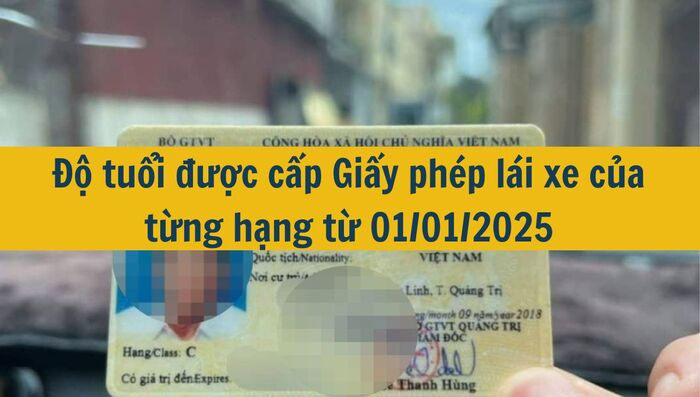
Độ tuổi được cấp Giấy phép lái xe của từng hạng từ 01/01/2025
Từ ngày 01/01/2025, với sự ra đời của Luật Trật tự, an toàn giao thông đường bộ 2024, đã có nhiều quy định mới được ban hành, trong đó đặc biệt là các quy định liên quan đến giấy phép lái xe. Vậy theo quy định mới nhất, độ tuổi được cấp Giấy phép lái xe của từng hạng từ 01/01/2025 là bao nhiêu? Hãy cùng theo dõi bài viết sau để tìm được câu trả lời chính xác nhất. 15/01/2025Đăng ký tạm trú online Hà Nội nhanh chóng và hiệu quả mới nhất năm 2025?

Đăng ký tạm trú online Hà Nội nhanh chóng và hiệu quả mới nhất năm 2025?
Đăng ký tạm trú online là thủ tục đăng ký tạm trú đang được người dân sử dụng ngày càng nhiều và phổ biến. Việc đăng ký tạm trú online giúp tiết kiệm thời gian, chi phí, công sức mà hiệu quả cao. Bài viết sau đây sẽ làm rõ về thủ tục đăng ký tạm trú online Hà Nội nhanh chóng và hiệu quả mới nhất năm 2025. 08/01/2025Đăng ký tạm trú online TP. HCM nhanh chóng và hiệu quả theo quy định mới nhất 2025?

Đăng ký tạm trú online TP. HCM nhanh chóng và hiệu quả theo quy định mới nhất 2025?
Đăng ký hoặc khai báo tạm trú giúp bảo vệ người dân, đảm bảo tình hình an toàn xã hội, thuận tiện cho cơ quan chức năng trong việc quản lý dân cư và dữ liệu công dân. Các cá nhân phải tiến hành khai báo về cư trú đầy đủ và chính xác. Bài viết sau đây sẽ làm rõ về cách thức đăng ký tạm trú online TP. HCM nhanh chóng và hiệu quả theo quy định mới nhất 2025. 07/01/2025Nhập hộ khẩu bao lâu có kết quả mới nhất năm 2025?
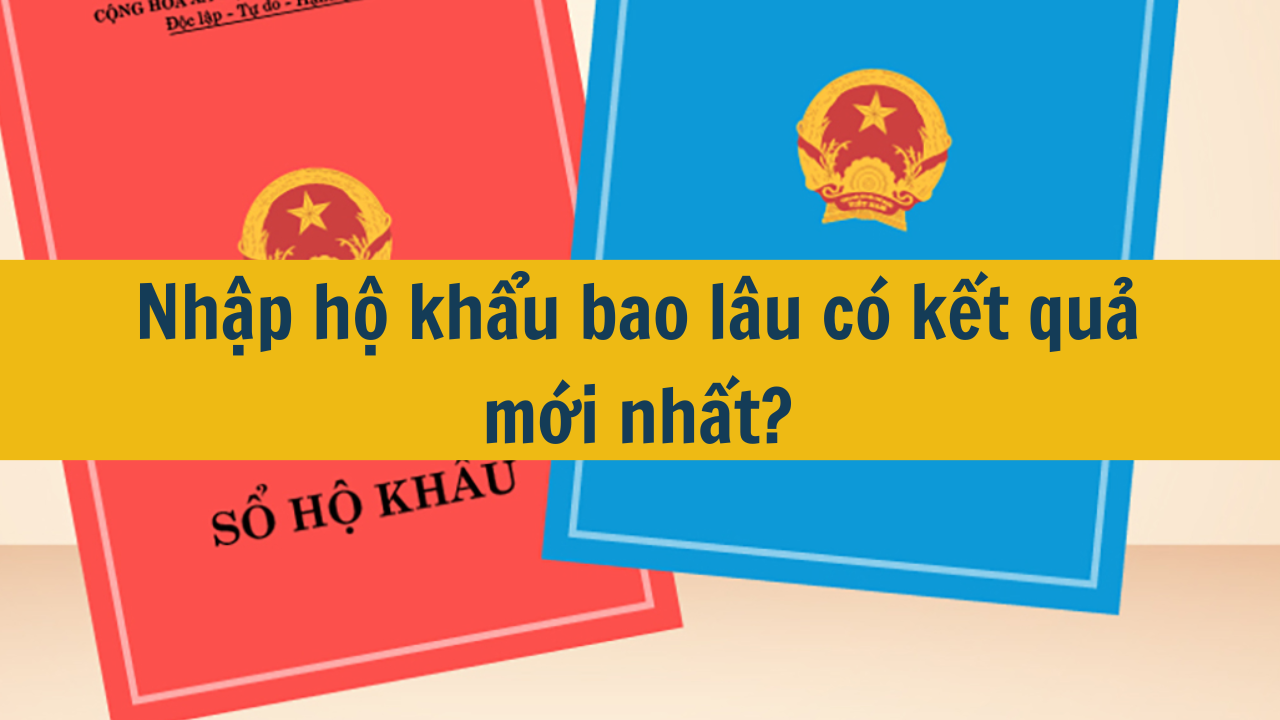
Nhập hộ khẩu bao lâu có kết quả mới nhất năm 2025?
Việc nhập hộ khẩu là một thủ tục hành chính quan trọng và cần thiết đối với công dân Việt Nam, giúp xác định nơi cư trú và quyền lợi của người dân. Tuy nhiên, nhiều người vẫn còn băn khoăn về thời gian xử lý hồ sơ nhập hộ khẩu và các yếu tố ảnh hưởng đến quá trình này. Trong bài viết này, chúng ta sẽ tìm hiểu về quy trình nhập hộ khẩu và thời gian bao lâu có kết quả mới nhất vào năm 2025, giúp bạn có cái nhìn rõ ràng hơn và chuẩn bị tốt hơn khi thực hiện thủ tục này. 27/12/2024Nhập hộ khẩu cần chuẩn bị những giấy tờ gì mới nhất năm 2025?
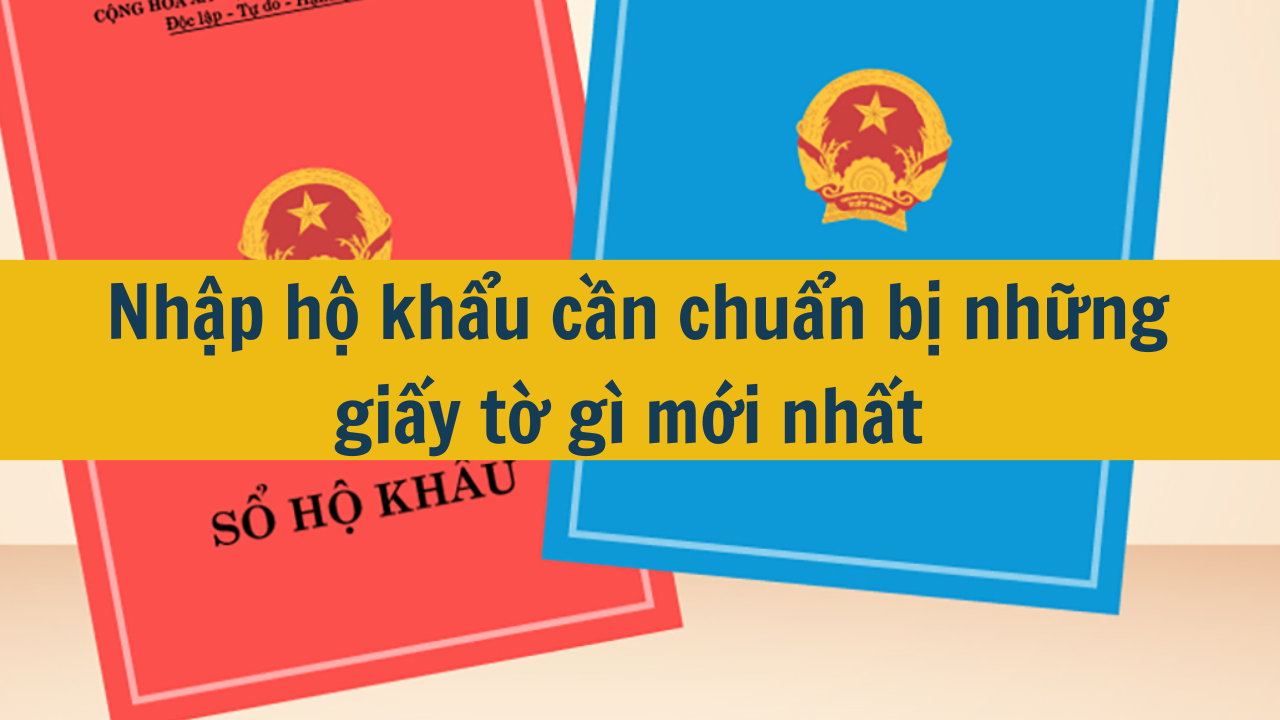
Nhập hộ khẩu cần chuẩn bị những giấy tờ gì mới nhất năm 2025?
Nhập hộ khẩu là một bước quan trọng trong việc xác định nơi cư trú và quyền lợi của mỗi công dân. Đặc biệt, năm 2025, các quy định về giấy tờ cần thiết để thực hiện thủ tục này đã có những cập nhật đáng chú ý. Trong bài viết này, chúng tôi sẽ hướng dẫn bạn về những giấy tờ mới nhất mà bạn cần chuẩn bị khi nhập hộ khẩu, giúp quá trình thực hiện trở nên nhanh chóng và thuận tiện hơn. Hãy cùng khám phá để đảm bảo bạn có đầy đủ thông tin và tài liệu cần thiết cho việc đăng ký hộ khẩu một cách suôn sẻ! 27/12/2024Điều kiện đăng ký hộ khẩu tại TP. HCM, Hà Nội mới nhất năm 2025

Điều kiện đăng ký hộ khẩu tại TP. HCM, Hà Nội mới nhất năm 2025
Đăng ký hộ khẩu là một trong những thủ tục quan trọng trong đời sống của mỗi công dân, đặc biệt tại những thành phố lớn như TP. HCM và Hà Nội. Năm 2025, quy định về điều kiện đăng ký hộ khẩu đã có nhiều thay đổi nhằm tạo điều kiện thuận lợi hơn cho người dân. Bài viết này sẽ cung cấp thông tin chi tiết về các điều kiện mới nhất để đăng ký hộ khẩu tại hai thành phố này, giúp bạn nắm rõ những yêu cầu cần thiết, từ giấy tờ đến quy trình thực hiện. Hãy cùng tìm hiểu để không bỏ lỡ cơ hội hưởng lợi từ những chính sách mới! 13/01/2025Hướng dẫn đăng ký nhập hộ khẩu online ngay tại nhà nhanh chóng năm 2025

Hướng dẫn đăng ký nhập hộ khẩu online ngay tại nhà nhanh chóng năm 2025
Trong thời đại công nghệ 4.0, việc thực hiện các thủ tục hành chính trở nên dễ dàng và tiện lợi hơn bao giờ hết. Năm 2025, đăng ký nhập hộ khẩu online ngay tại nhà không chỉ giúp tiết kiệm thời gian mà còn giảm bớt những phiền phức khi phải đến trực tiếp cơ quan chức năng. Bài viết này sẽ hướng dẫn bạn từng bước để thực hiện thủ tục này một cách nhanh chóng và hiệu quả, giúp bạn nắm rõ quy trình và những lưu ý cần thiết để hoàn tất việc đăng ký hộ khẩu một cách suôn sẻ. Hãy cùng khám phá những tiện ích mà dịch vụ trực tuyến mang lại. 27/12/2024Nhập khẩu Hà Nội hết bao nhiêu tiền năm 2025?
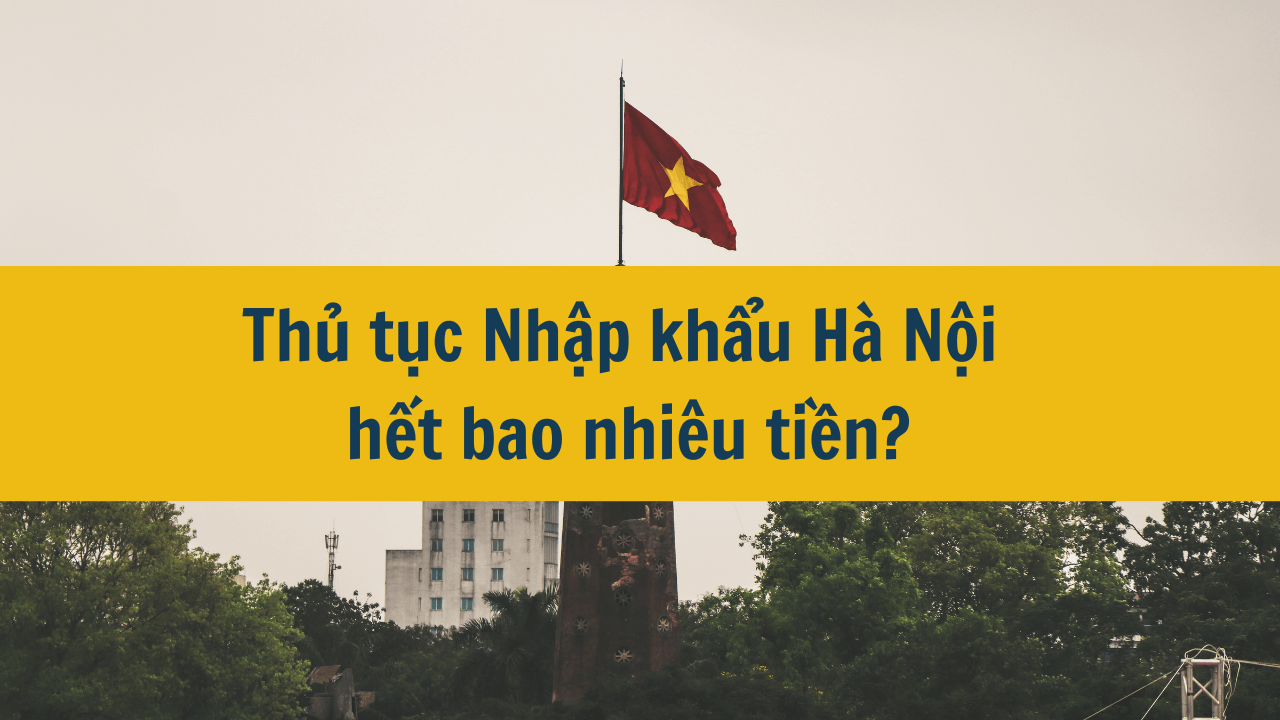
Nhập khẩu Hà Nội hết bao nhiêu tiền năm 2025?
Việc nhập khẩu vào Hà Nội năm 2024 không có chi phí chính thức nào được quy định cho việc nộp hồ sơ đăng ký thường trú. Tuy nhiên, một số chi phí có thể phát sinh liên quan đến thủ tục hành chính và các giấy tờ cần thiết. Dưới đây là một số thông tin liên quan. 13/01/2025Hướng dẫn thủ tục nhập hộ khẩu Hà Nội, TP Hồ Chí Minh từ 01/7/2021
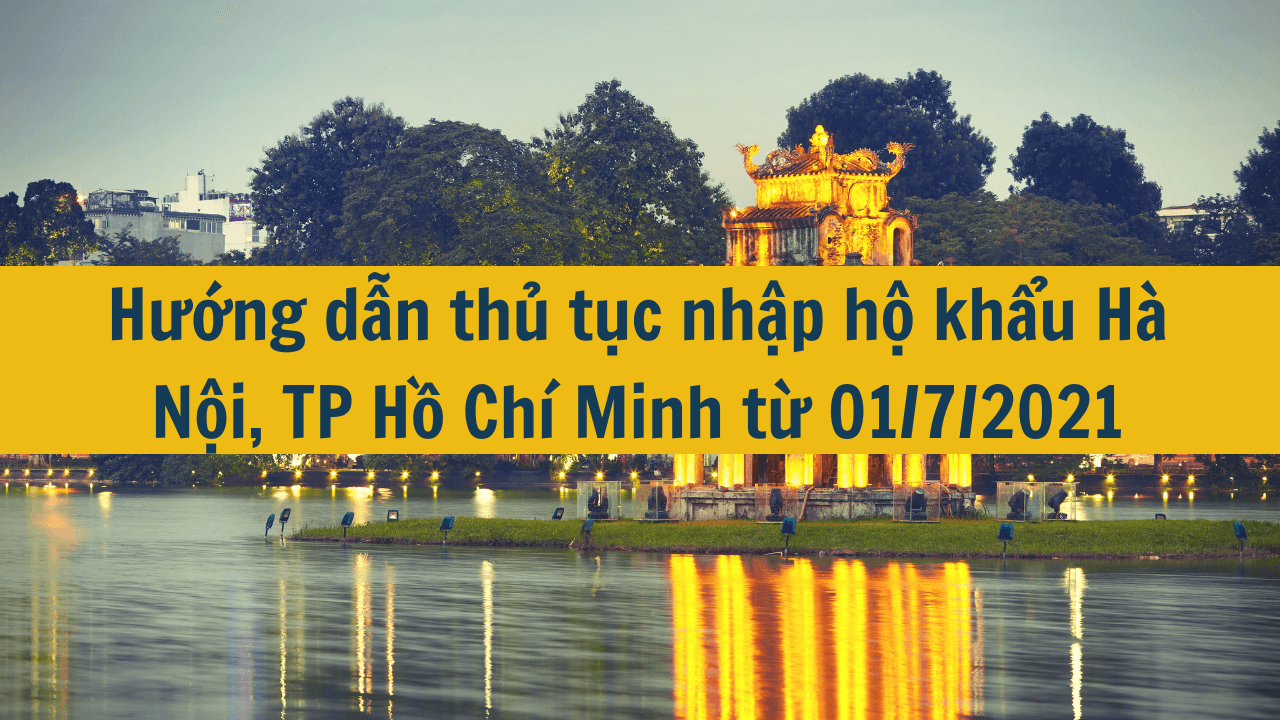

 Luật người cao tuổi năm 2009 (Bản Word)
Luật người cao tuổi năm 2009 (Bản Word)
 Luật người cao tuổi năm 2009 (Bản Pdf)
Luật người cao tuổi năm 2009 (Bản Pdf)